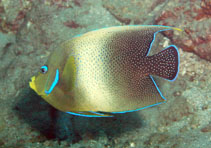| Family: |
Pomacanthidae (Angelfishes) |
| Max. size: |
40 cm SL (male/unsexed) |
| Environment: |
reef-associated; marine; depth range 1 - 40 m, non-migratory |
| Distribution: |
Indo-West Pacific: Red Sea and East Africa to Samoa, north to southern Japan, south to Western Australia and New South Wales, including Lord Howe Island (Ref. 1602). |
| Diagnosis: |
Dorsal spines (total): 13-13; Dorsal soft rays (total): 20-23; Anal spines: 3-3; Anal soft rays: 18-22. Description: Juveniles of this species are bluish black with concentric white semi-circles. Adults brownish on anterior and posterior third of the body; middle portion greenish or yellowish; numerous blue spots on the sides; posterior part of dorsal and anal fins prolonged as a filament, the tips bright yellow. Transformation to the adult color pattern occurs over the size range of about 8 - 16 cm (Ref. 1602). Body depth 1.6-1.9 in SL. Scales longitudinal series 65-70 (Ref. 90102). |
| Biology: |
Juveniles inhabit shallow protected areas, while adults prefer coastal reefs with heavy coral growth providing ample hiding places. Generally solitary or in pairs. Feeds on sponges, tunicates, and algae (Ref. 30573). The young are excellent aquarium fish and suitable for a community tank. |
| IUCN Red List Status: |
Least Concern (LC); Date assessed: 08 October 2009 Ref. (130435)
|
| Threat to humans: |
harmless |
Source and more info: www.fishbase.org. For personal, classroom, and other internal use only. Not for publication.

